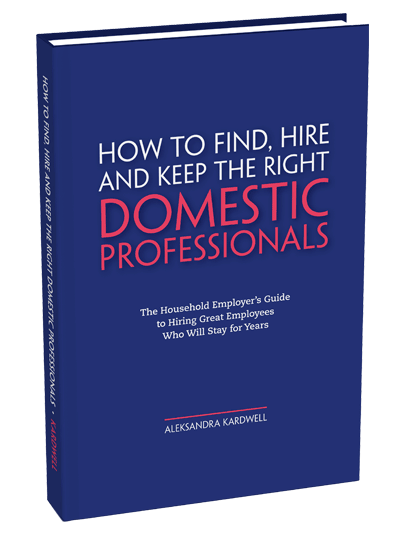Household Staffing > Domestic Workers Rights 1

I also recommend that you stay abreast of changes in domestic employment law. In November of 2018, the first National Domestic Workers Bill of Rights was unveiled by the National Domestic Workers Alliance (NDWA), a labor advocacy group founded in 2007. The bill would affect pay levels and working conditions for domestic workers, and some expect that legislation will be introduced to Congress this year (2019). You can track developments related to the proposed bill at www.domesticworkers.org.
I expect that you’ll find the information in this section helpful; however, I must emphasize that every employer situation is unique. Moreover, while my attorney, Steven T. Russell of Bayport, NY, was kind enough to review the material contained herein, the best person to advise you on your unique situation is your personal attorney. Accordingly, I’ll include the obligatory legal disclaimer here: the information in this book is just that — information that, if used, is done so at your own risk — and it does not constitute any sort of legal advice.
With that said, let’s dig into the legal landscape of domestic employment. The key regulators within the domestic employment industry are:
- the U.S. Department of Labor
- the Equal Employment Opportunities Commission
- various departments and agencies within the individual state and many local governments,
- the Internal Revenue Service, and
- U.S. Citizenship and Immigration Services
While the number and mix of legal requirements can be overwhelming, domestic employers who do not adhere to federal, state and local laws can expose themselves to fines and lawsuits. The following sections provide key information directly from the U.S. Department of Labor, the U.S. Equal Employment Opportunities Commission, and the other main regulators. The information below is current as of the time of this writing.
1) U.S. Department of Labor (DOL) Requirements
A good place to start in reviewing the DOL’s requirements is the “homecare” frequently asked questions page from the department’s website.
This page provides an excellent overview of The Fair Labor Standards Act (FLSA), which is a body of federal law covering wages, as they relate to domestic workers (please note: while the above-referenced web page has “homecare” in its URL, the information applies to domestic service workers broadly). In 1938, Congress passed the FLSA “to provide minimum wage and overtime protections for workers, to prevent unfair competition among businesses based on subminimum wages, and to spread employment by requiring employers whose employees work excessive hours to compensate employees at one-and-one-half times the regular rate of pay for all hours worked over 40.”
While the FLSA did not initially protect domestic workers, such as cooks, housekeepers, maids, and gardeners, Congress extended coverage to “domestic service” workers in 1974. The FLSA now applies to “employees performing household services in a private home, including those domestic service workers employed directly by households or by companies too small to be covered as enterprises under the Act.”
Although the 1974 amendments of the FLSA extended coverage to domestic employees, certain workers remain exempt from the FLSA’s minimum wage and overtime provisions. Specifically, “casual babysitters and domestic service workers employed to provide ‘companionship services’ to elderly persons or persons with illnesses, injuries, or disabilities are not required to be paid the minimum wage or overtime pay. Congress also created an exemption only from the overtime pay requirement for live-in domestic service workers.” The Department of Labor issued final regulations in 1975 to implement these exemptions, and there has been little revision of domestic service wage regulations since that time.
Below is additional information about the provisions of the FLSA, including who the DOL defines as a domestic employer, who the DOL defines as a domestic worker, and what the DOL requires of households that employ domestic workers. For accuracy — and given the technical nature of the subject — much of the information is taken word-for-word from the DOL’s website.
Question 1: What does it mean to be an employer under the Fair Labor Standards Act (which governs employers, including household employers)?
Answer: The Fair Labor Standards Act (FLSA) defines “employer” as any person acting directly or indirectly in the interest of an employer in relation to an employee. The FLSA further defines an “employee” as any individual employed by an employer and “employ” as to suffer or permit to work. The definition of employer is necessarily a broad one, in accordance with the remedial purpose of the FLSA.
“An individual, family, or household receiving services provided by a direct care worker typically acts as an ’employer’ of the direct care worker under the FLSA. A single individual may be considered an employee of more than one employer under the FLSA. For example, an agency that sends a direct care worker to an individual’s home may be a joint employer with the individual, family or household to whom the direct care worker provides services.”
For more information relating to the employment relationship, please download the DOL Fact Sheet (#13).
This document provides general information concerning the meaning of “employment relationship” and the significance of that determination in applying provisions of the FLSA.
So, who exactly qualifies as a domestic worker? According to the DOL,
“Domestic service workers provide services of a household nature in or about a private home. Persons employed in domestic service in private homes are covered by the FLSA. Domestic service workers include companions, babysitters, cooks, waiters, maids, housekeepers, nannies, nurses, janitors, caretakers, handymen, gardeners, home health aides, personal care aides, and family chauffeurs. Services that are not performed in or about a private home are not considered ‘domestic service employment’ under the FLSA.”
Now that we’ve covered how the DOL defines the terms “household employer” and “household employee,” we can turn to the DOL’s employer requirements. DOL Fact Sheet #13: Employment Relationship Under the Fair Labor Standards Act (FLSA) explains that employers must abide by the following requirements:
“When it has been determined that an employer-employee relationship does exist, and the employee is engaged in work that is subject to the Act, it is required that the employee be paid at least the Federal minimum wage of … $7.25 per hour [($9.25 per hour if the household has four or more employees)] effective July 24, 2009, and in most cases overtime at time and one-half his/her regular rate of pay for all hours worked in excess of 40 per week.”
Of course, for employers located in a state that has a minimum wage higher than the federal minimum wage, the employers must abide by the state requirements. In addition to its wage rules, the FLSA also stipulates record-keeping requirements. DOL Fact Sheet #79C: Recordkeeping Requirements for Individuals, Families, or Households Who Employ Domestic Service Workers Under the Fair Labor Standards Act (FLSA), provides information about employee records that must be maintained:
“Employers subject to the FLSA must make, keep, and preserve records for each domestic service worker who is entitled to minimum wage and/or overtime pay. The law requires no particular form of records, but does require that the records include certain information about the employee and data about the hours worked and wages earned. (See 79F: Paid Family or Household Members in Certain Medicaid-Funded and Certain Other Publicly Funded Programs Offering Home Care Services Under the Fair Labor Standards Act (FLSA) for information on determining whether a domestic service worker employed by an individual, family or household must be paid minimum wage and overtime pay.) The employer may require a domestic service worker to record all hours worked and submit the record to the employer.
The obligation to make and keep records, however, is the responsibility of the employer.
Basic records that an employer must maintain include:
- Employee’s full name and social security number;
- Home address, including zip code;
- Hours worked each workday and total hours worked each workweek;
- Total cash wages paid each week to the employee by the employer;
- Weekly sums claimed by the employer for board, lodging or other facilities; and
- Extra pay for weekly hours worked in excess of 40 by the employee for the employer.”
Read Part II of our legal information here: Domestic Workers Rights – The Legal Landscape of Household Staffing, Part II
Looking to learn more about today’s best practices for hiring household staff? Take advantage of our special offer below!
|
|
Principals, Managers & Assistants – Now you can request a complimentary copy of the newly released book for household employers by Hamptons Employment Agency, Inc. Founder and President, Aleksandra Kardwell…How to Find, Hire, and Keep the Right Domestic Professionals The Household Employer’s Guide to Hiring Great Employees Who Will Stay for Years Request your complimentary copy today by clicking here or on the book image at left. |
Or, contact us today for a free, no-obligation, privacy-assured phone consultation. Give us a call at one of our four locations listed below. We look forward to hearing from you regarding your domestic staffing needs.
Hamptons Office: 631-204-1100
New York City Office: 212-810-9828
Florida Office: 561-560-0001
Or, use our brief and easy online Staffing Inquiry Form.
We look forward to hearing from you regarding your Household Staffing needs.

